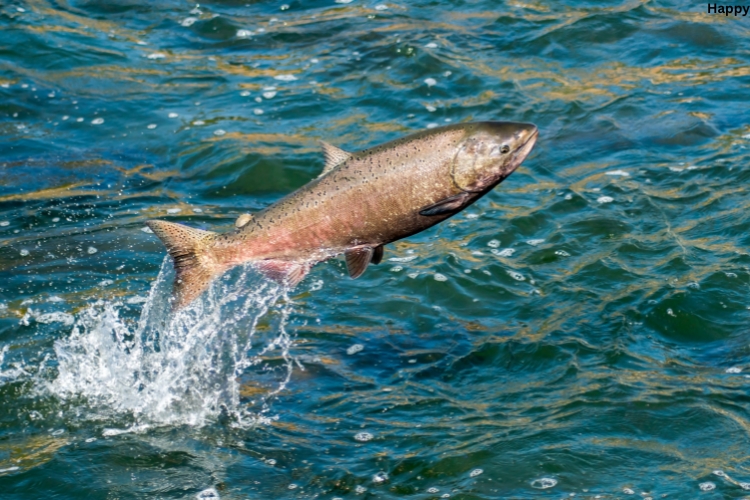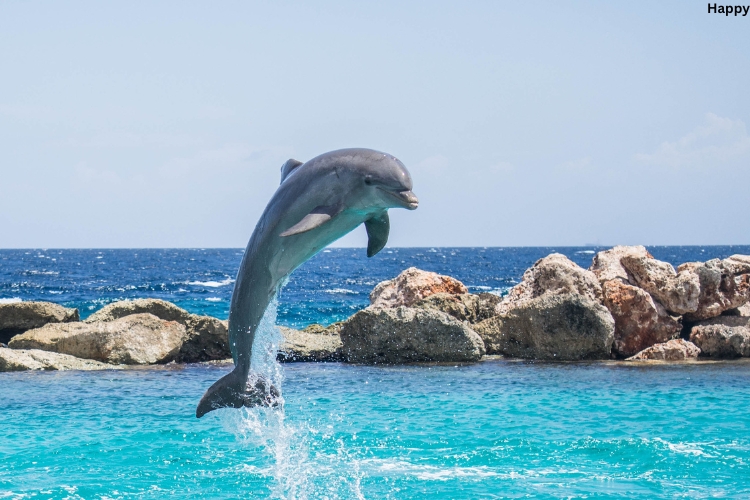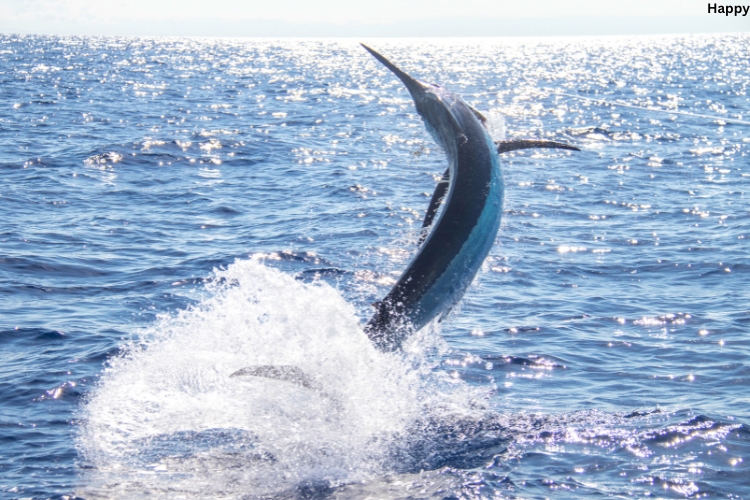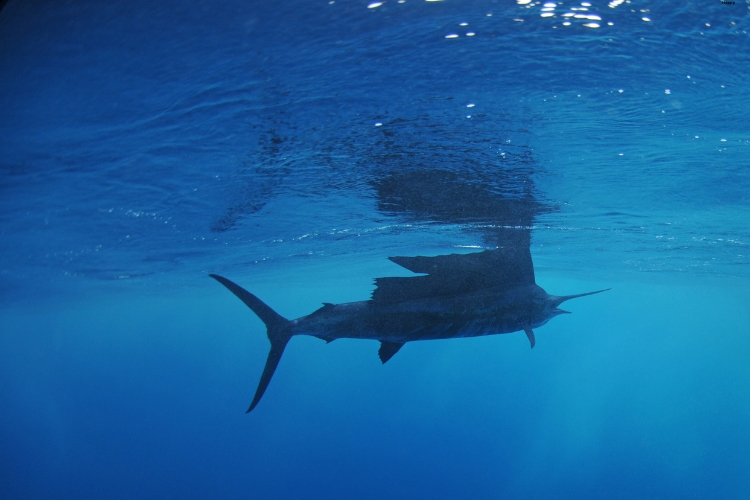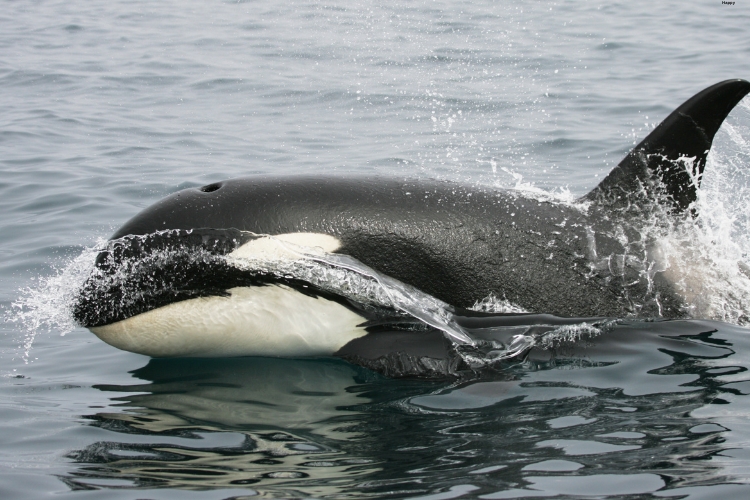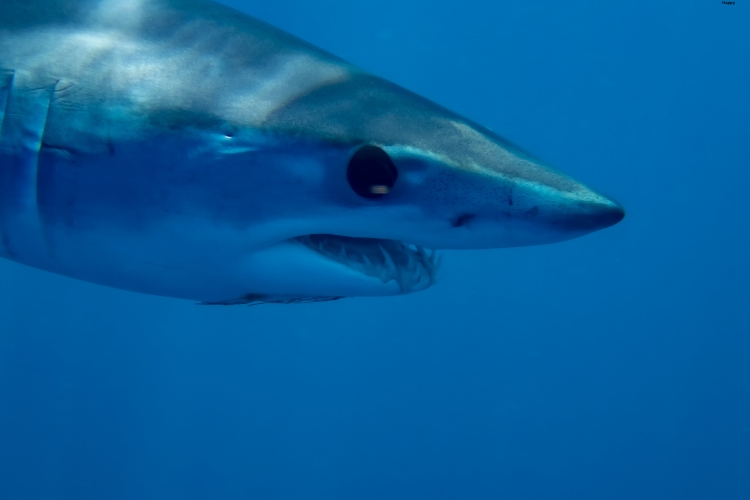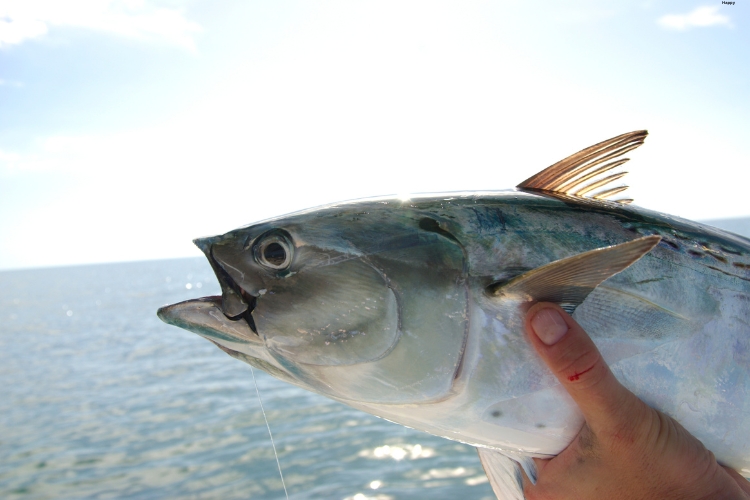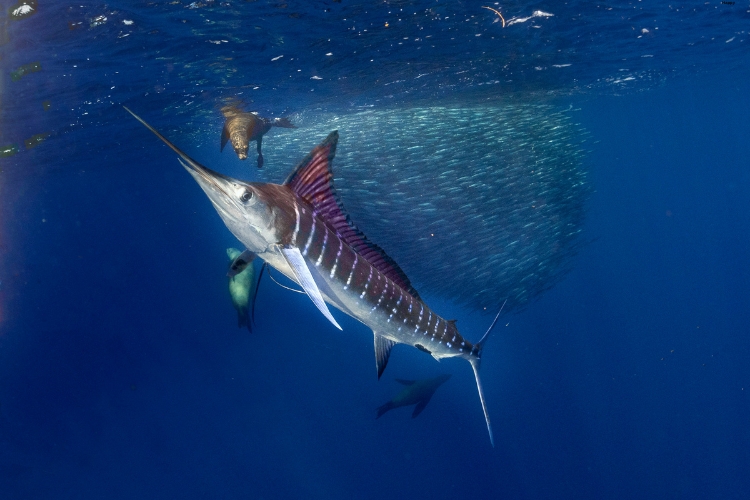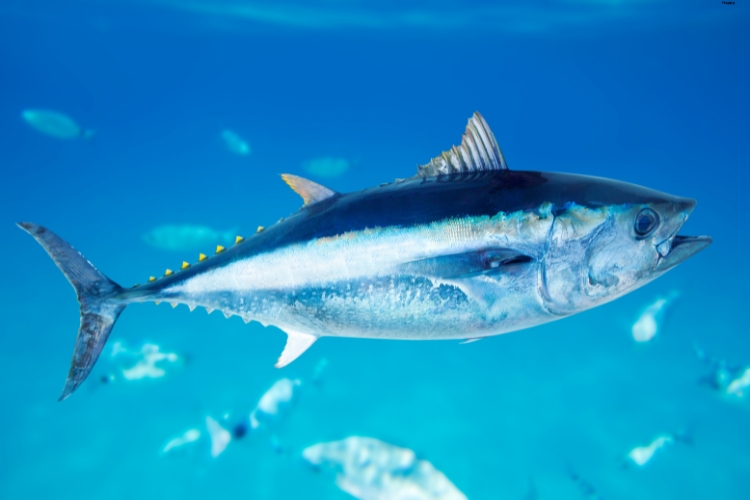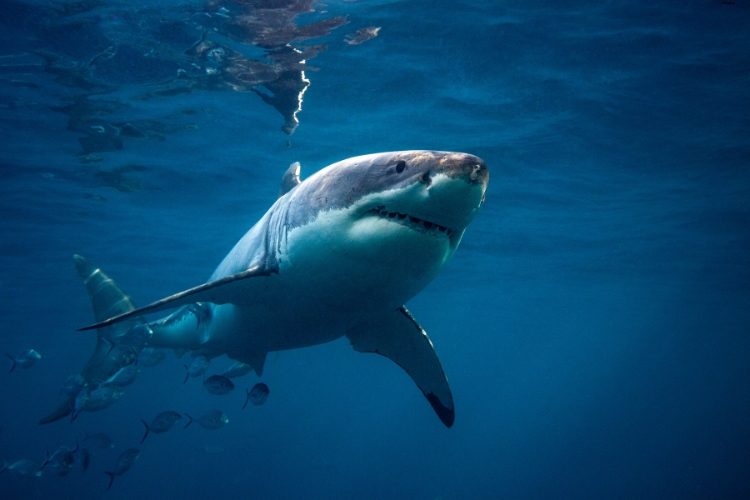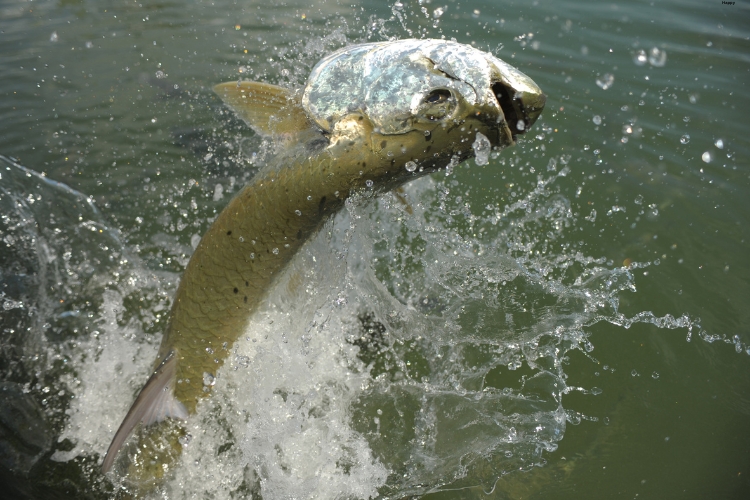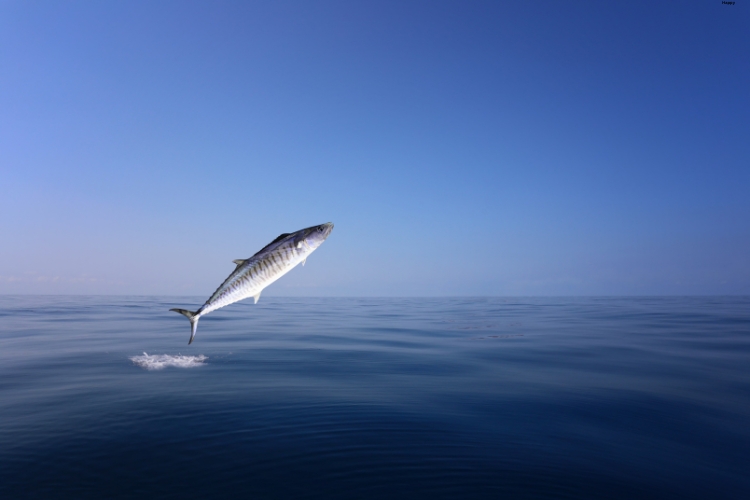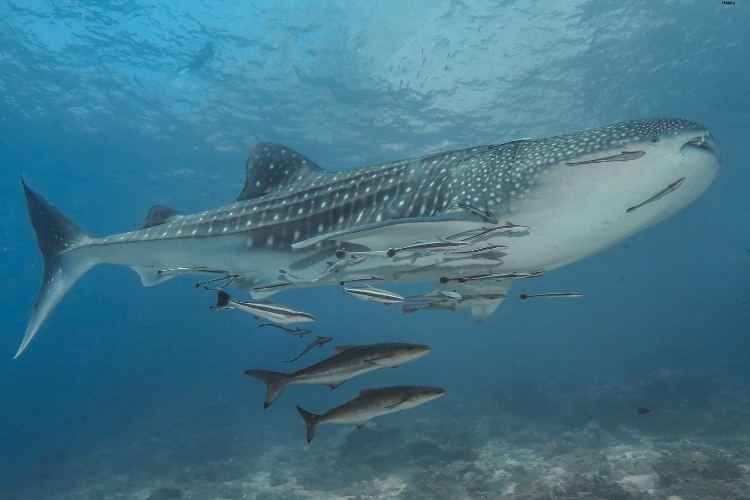The vast oceans of our planet are home to some of nature’s most impressive swimmers. From predators chasing their prey to smaller fish evading danger, speed is a crucial adaptation for survival in the marine world.
In this blog post, we’ll explore the 25 fastest swimming fish on the planet, delving into their unique characteristics, habitats, and the science behind their impressive velocities.
Why Speed Matters in the Ocean
Before we plunge into our list of aquatic speedsters, it’s essential to understand the importance of speed in marine ecosystems:
- Predator evasion: Swift swimming can mean the difference between life and death when escaping predators.
- Hunting efficiency: Speed gives predatory fish an edge in catching elusive prey.
- Migration: Some species need to cover vast distances quickly for breeding or feeding purposes.
- Energy conservation: Efficient swimming helps fish conserve energy in strong currents.
The Science Behind Fish Speed
Hydrodynamics and Fish Anatomy
The fastest fish in the ocean have evolved specific anatomical features that contribute to their impressive speeds:
- Streamlined body shape: Reduces drag in the water
- Powerful muscles: Especially in the tail region for propulsion
- Rigid bodies: Minimize energy loss during movement
- Specialized fins: Aid in stabilization and quick direction changes
Measuring Fish Speed
Scientists use various methods to measure fish speed:
- Tracking devices: Attached to fish to monitor their movements in the wild
- High-speed cameras: Used in controlled environments to analyze swim patterns
- Computer modeling: Simulates fish movement based on physical properties
It’s important to note that fish speeds can vary depending on the measurement method and conditions.
The Top 25 Fastest Swimming Fish
Now, let’s look into our list of the ocean’s speed champions. We’ll start with a table summarizing the top 10, followed by detailed descriptions of all 25 species.
| Rank | Fish Species | Top Speed (mph) | Top Speed (km/h) | Habitat | Notable Feature |
|---|---|---|---|---|---|
| 1 | Sailfish | 68 | 109.4 | Tropical and temperate waters | Distinctive sail-like dorsal fin |
| 2 | Black Marlin | 82 | 132.0 | Tropical and subtropical waters | Rigid pectoral fins |
| 3 | Swordfish | 60 | 96.6 | Temperate and tropical oceans | Long, flat bill |
| 4 | Wahoo | 48 | 77.2 | Tropical and subtropical waters | Slender body with sharp teeth |
| 5 | Yellowfin Tuna | 47 | 75.6 | Tropical and subtropical oceans | Yellow fins, especially in adults |
| 6 | Mako Shark | 46 | 74.0 | Temperate and tropical waters | Endothermic body |
| 7 | Bluefin Tuna | 43 | 69.2 | Atlantic Ocean, Mediterranean Sea | Can weigh up to 1,500 pounds |
| 8 | Bonito | 40 | 64.4 | Atlantic Ocean, Mediterranean Sea | Strong, oily flesh |
| 9 | Bonefish | 40 | 64.4 | Tropical and subtropical coastal waters | Excellent eyesight |
| 10 | Four-wing Flying Fish | 35 | 56.3 | Tropical and warm temperate waters | Can glide above water surface |
| 11 | Striped Marlin | 50 | 80.5 | Pacific and Indian Oceans | Distinctive vertical stripes |
| 12 | Mahi-mahi | 57 | 91.7 | Tropical and subtropical waters | Vibrant colors that fade after death |
| 13 | Great White Shark | 35 | 56.3 | Coastal and offshore waters worldwide | Powerful sense of smell |
| 14 | Atlantic Blue Marlin | 50 | 80.5 | Tropical and subtropical Atlantic | Females much larger than males |
| 15 | Skipjack Tuna | 37 | 59.5 | Tropical and warm temperate waters | No scales on most of body |
| 16 | Albacore Tuna | 40 | 64.4 | Temperate and tropical oceans | Long pectoral fins |
| 17 | Barracuda | 36 | 57.9 | Tropical and subtropical waters | Fierce predator with large teeth |
| 18 | Tarpon | 35 | 56.3 | Coastal waters and estuaries | Can breathe air at surface |
| 19 | Sockeye Salmon | 34 | 54.7 | North Pacific Ocean and rivers | Turns bright red during spawning |
| 20 | Dorado | 50 | 80.5 | Tropical and subtropical waters | Also known as dolphinfish |
| 21 | Striped Bass | 35 | 56.3 | Atlantic coast of North America | Popular game fish |
| 22 | King Mackerel | 34 | 54.7 | Atlantic Ocean and Gulf of Mexico | Long, slender body |
| 23 | Bluefish | 40 | 64.4 | Temperate and subtropical waters | Aggressive feeding behavior |
| 24 | Permit | 30 | 48.3 | Tropical and subtropical waters | Silvery, flat-sided body |
| 25 | Roosterfish | 32 | 51.5 | Eastern Pacific coastal waters | Distinctive dorsal fin resembling a rooster’s comb |
1. Sailfish (Istiophorus platypterus)
The sailfish, with its distinctive sail-like dorsal fin, is widely recognized as the fastest fish in the ocean.
- Top speed: 68 mph (109.4 km/h)
- Habitat: Tropical and temperate waters worldwide
- Unique features:
- Long, sword-like bill
- Huge dorsal fin that can be larger than the fish’s body length
- Can change colors rapidly, aiding in hunting and communication
2. Black Marlin (Istiompax indica)
The black marlin is not only one of the fastest fish but also one of the largest billfish species.
- Top speed: 82 mph (132.0 km/h)
- Habitat: Tropical and subtropical waters of the Indian and Pacific Oceans
- Unique features:
- Rigid pectoral fins that cannot be folded flat against the body
- Can weigh up to 1,500 pounds (680 kg)
- Highly sought after in sport fishing
3. Swordfish (Xiphias gladius)
The swordfish, known for its long, flat bill, is a formidable predator and swift swimmer.
- Top speed: 60 mph (96.6 km/h)
- Habitat: Temperate and tropical oceans worldwide
- Unique features:
- Loses all teeth and scales by adulthood
- Can heat its eyes and brain to improve vision when hunting
- Migrates long distances, following prey and water temperature
4. Wahoo (Acanthocybium solandri)
The wahoo is a slender, fast-swimming predator known for its high-quality meat.
- Top speed: 48 mph (77.2 km/h)
- Habitat: Tropical and subtropical waters worldwide
- Unique features:
- Long, slender body with blue-green upper body and silvery sides
- Sharp, scissor-like teeth
- Solitary or found in loose-knit groups
5. Yellowfin Tuna (Thunnus albacares)
Yellowfin tuna are prized both commercially and in sport fishing for their speed and taste.
- Top speed: 47 mph (75.6 km/h)
- Habitat: Tropical and subtropical oceans worldwide
- Unique features:
- Distinctive yellow fins, especially prominent in adults
- Can grow up to 7 feet (2.1 m) in length
- Highly migratory, capable of crossing entire oceans
6. Mako Shark (Isurus oxyrinchus)
The mako shark is the fastest shark species and one of the ocean’s top predators.
- Top speed: 46 mph (74.0 km/h)
- Habitat: Temperate and tropical waters worldwide
- Unique features:
- Endothermic, able to maintain a body temperature higher than the surrounding water
- Known for spectacular leaps out of the water when hooked
- Streamlined body shape with a pointed snout
7. Bluefin Tuna (Thunnus thynnus)
Bluefin tuna are powerful, fast-swimming fish highly valued in the sushi market.
- Top speed: 43 mph (69.2 km/h)
- Habitat: Atlantic Ocean and Mediterranean Sea
- Unique features:
- Can weigh up to 1,500 pounds (680 kg)
- Endothermic, maintaining a warm body temperature
- Highly migratory, crossing entire oceans for feeding and spawning
8. Bonito (Sarda sarda)
Bonito are medium-sized predatory fish related to tuna and mackerel.
- Top speed: 40 mph (64.4 km/h)
- Habitat: Atlantic Ocean, Mediterranean Sea, and Black Sea
- Unique features:
- Streamlined body with dark blue-black back and silver belly
- Known for their strong, oily flesh
- Often found in schools, especially when young
9. Bonefish (Albula vulpes)
Bonefish are prized by anglers for their speed and fighting ability when hooked.
- Top speed: 40 mph (64.4 km/h)
- Habitat: Tropical and subtropical shallow coastal waters
- Unique features:
- Silver-colored with dark streaks on their sides
- Excellent eyesight, making them challenging to catch
- Can tolerate waters with low oxygen levels
10. Four-wing Flying Fish (Hirundichthys affinis)
These remarkable fish can glide above the water’s surface for considerable distances.
- Top speed: 35 mph (56.3 km/h)
- Habitat: Tropical and warm temperate waters worldwide
- Unique features:
- Two pairs of enlarged fins that act as wings
- Can glide for up to 650 feet (200 m)
- Use their speed to escape predators both in and out of water
11. Striped Marlin (Kajikia audax)
The striped marlin is known for its beautiful coloration and impressive speed.
- Top speed: 50 mph (80.5 km/h)
- Habitat: Tropical and temperate waters of the Pacific and Indian Oceans
- Unique features:
- Distinctive vertical stripes on their bodies
- Long, spear-like bill used for hunting
- Highly acrobatic, often leaping out of the water
12. Mahi-mahi (Coryphaena hippurus)
Also known as dorado or dolphinfish, mahi-mahi are fast swimmers and popular game fish.
- Top speed: 57 mph (91.7 km/h)
- Habitat: Tropical and subtropical waters worldwide
- Unique features:
- Vibrant colors that fade quickly after death
- Compressed, deep body with a blunt face
- Males have prominent foreheads
13. Great White Shark (Carcharodon carcharias)
While not the fastest shark, the great white is still an impressive swimmer.
- Top speed: 35 mph (56.3 km/h)
- Habitat: Coastal and offshore waters worldwide
- Unique features:
- Powerful sense of smell for detecting prey
- Can breach completely out of the water when attacking
- Largest predatory fish in the ocean
14. Atlantic Blue Marlin (Makaira nigricans)
The Atlantic blue marlin is a highly sought-after game fish known for its speed and size.
- Top speed: 50 mph (80.5 km/h)
- Habitat: Tropical and subtropical waters of the Atlantic Ocean
- Unique features:
- Females can grow much larger than males
- Long, spear-like bill used for stunning prey
- Can change color rapidly when excited or hunting
15. Skipjack Tuna (Katsuwonus pelamis)
Skipjack tuna are smaller than their bluefin and yellowfin cousins but still impressively fast.
- Top speed: 37 mph (59.5 km/h)
- Habitat: Tropical and warm temperate waters worldwide
- Unique features:
- Dark purplish-blue back with silver belly
- No scales on most of the body
- Often found in large schools
16. Albacore Tuna (Thunnus alalunga)
Albacore tuna are known for their long pectoral fins and high-quality meat.
- Top speed: 50 mph (80.5 km/h)
- Habitat: Temperate and tropical waters worldwide
- Unique features:
- Distinctively long pectoral fins
- Lighter-colored flesh compared to other tuna species
- Highly migratory, traveling in schools
17. Blue Shark (Prionace glauca)
The blue shark is a swift, open-ocean predator known for its long migrations.
- Top speed: 43 mph (69.2 km/h)
- Habitat: Deep, cool oceanic waters worldwide
- Unique features:
- Slender body with distinctive blue coloration
- Large eyes relative to body size
- Known to travel great distances, sometimes crossing entire ocean basins
18. Atlantic Needlefish (Strongylura marina)
Needlefish are known for their long, needle-like beaks and ability to leap out of the water.
- Top speed: 37 mph (59.5 km/h)
- Habitat: Coastal waters of the western Atlantic Ocean
- Unique features:
- Extremely elongated jaws filled with sharp teeth
- Can leap out of the water and glide short distances
- Often hunt in schools near the water’s surface
19. Tarpon (Megalops atlanticus)
Tarpon are large, powerful fish prized by sport fishermen for their fighting ability.
- Top speed: 35 mph (56.3 km/h)
- Habitat: Coastal waters of the Atlantic Ocean and Gulf of Mexico
- Unique features:
- Can grow up to 8 feet (2.4 m) long and weigh over 280 pounds (127 kg)
- Able to breathe air, allowing them to survive in low-oxygen waters
- Known for their spectacular leaps when hooked
20. Barracuda (Sphyraena barracuda)
Barracuda are fierce predators known for their speed and powerful jaws.
- Top speed: 36 mph (58 km/h)
- Habitat: Tropical and subtropical waters worldwide
- Unique features:
- Long, cylindrical body with large, powerful jaws
- Sharp, fang-like teeth
- Often hunt in schools, using ambush tactics
21. Atlantic Salmon (Salmo salar)
While not as fast as some ocean-dwelling fish, salmon are impressive swimmers in their own right.
- Top speed: 25 mph (40.2 km/h)
- Habitat: North Atlantic Ocean and coastal rivers
- Unique features:
- Able to leap up waterfalls during migration
- Change color during different life stages
- Highly valued for both commercial and sport fishing
22. King Mackerel (Scomberomorus cavalla)
King mackerel, also known as kingfish, are fast-swimming predators popular among sport fishermen.
- Top speed: 35 mph (56.3 km/h)
- Habitat: Western Atlantic Ocean and Gulf of Mexico
- Unique features:
- Long, streamlined body with silvery sides and dark blue back
- Sharp teeth and excellent eyesight for hunting
- Often found in schools, especially when young
23. Striped Bass (Morone saxatilis)
Striped bass are popular game fish known for their speed and strength.
- Top speed: 35 mph (56.3 km/h)
- Habitat: Atlantic coast of North America and introduced to other areas
- Unique features:
- Distinctive horizontal stripes along their sides
- Can live in both freshwater and saltwater environments
- Known to form large schools during migration
24. Cobia (Rachycentron canadum)
Cobia are fast-swimming, migratory fish often mistaken for sharks due to their body shape.
- Top speed: 35 mph (56.3 km/h)
- Habitat: Warm waters worldwide, except for the eastern Pacific
- Unique features:
- Broad, flat head with protruding lower jaw
- Often associate with larger marine animals like sharks and rays
- Highly valued for their firm, white flesh
25. Bluefish (Pomatomus saltatrix)
Bluefish are aggressive predators known for their speed and voracious appetite.
- Top speed: 40 mph (64.4 km/h)
- Habitat: Temperate and subtropical waters worldwide
- Unique features:
- Strong, compressed body with a large mouth and sharp teeth
- Known for their aggressive feeding frenzies
- Popular among anglers for their fighting ability when hooked
Conclusion: The Marvels of Marine Speed
The 25 fastest swimming fish we’ve explored represent some of the most impressive athletes in the animal kingdom. From the lightning-fast sailfish to the powerful bluefish, these species have evolved remarkable adaptations to thrive in their aquatic environments.
Understanding the speed capabilities of these fish not only satisfies our curiosity but also provides valuable insights into marine ecology, evolution, and conservation. As we continue to study these magnificent creatures, we gain a deeper appreciation for the complexity and diversity of life in our oceans.
Whether you’re an angler, a marine biology enthusiast, or simply someone fascinated by the wonders of nature, the world of fast-swimming fish offers endless opportunities for discovery and amazement.
By learning about these species and their unique characteristics, we can better appreciate the importance of preserving our oceans and the incredible life they support.

